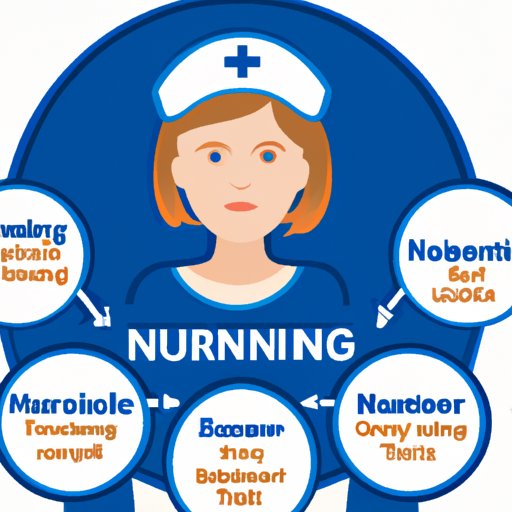
Introduction
A common question among nursing professionals is which specialties make the most money. With various options available, it can be challenging to know where to begin. However, having access and knowledge of this information is crucial for individuals in the nursing field planning to make the best career decisions. This article aims to provide a guide to the highest-paying nurse specialties, nursing salaries by location and education levels, gender bias in nursing salaries, the benefits package for nurses, and how nursing salaries compare to other healthcare professions to assist nurses in making informed career choices.
Top-Paying Nurse Specialties
Nursing has several specialties that are in high demand and pay exceedingly well. One of the vital job roles is the Certified Registered Nurse Anesthetists (CRNA), who is responsible for administering anesthesia during surgical procedures. According to the Bureau of Labor Statistics (BLS), CRNA’s median salary is around $181,040, making it one of the highest-paid nursing specialties.
Another high-paying nursing specialty is psychiatric nurse practitioners, who work with individuals battling mental health illnesses. These nurses provide counseling and care services that support the patients’ well-being, safety, and stability, all while making an average salary of $106,033 per year.
Pediatric endocrinology is another nursing specialty that offers high pay. It is the branch of medicine that deals with children’s hormones, their physical growth, and sexual development. Pediatric endocrinologists often receive an excellent salary, with a median income of $177,000 per year.
Other high-paying nursing specialties include Certified Nurse-Midwife, Gerontological Nurse Practitioner, Orthopedic Nurse Practitioner, Gastroenterology Nurse Practitioner, and Family Nurse Practitioner.
Nursing Salaries by Location
Nursing salaries vary based on location and region of work. For instance, nurses working in metropolitan areas typically earn higher salaries than those working in rural areas. According to the BLS, California, Hawaii, and Massachusetts are the highest paying states for nurse salaries, with California nurses earning an average salary of $113,240, Hawaii nurses earning an average salary of $104,060, and Massachusetts nurses earning an average salary of $93,160.
Factors that affect nursing salaries in different locations include the city or state’s economy and population. Job competition and the cost of living also play a crucial role in determining nursing salaries in different geographic locations.
Nursing Salaries by Level of Education
Nursing salaries also differ based on education level. Individuals with advanced or higher education degrees often earn more than those with entry-level degrees. The highest level of education, the Doctor of Nursing Practice (DNP), is offered to nursing professions looking for career advancement and specializations. DNPs reportedly earn a salary of around $110,000 per year. Meanwhile, a Master’s in Nursing Administration (MSN) is for nurses seeking administrative roles with a median salary of around $105,000 annually. Lastly, a Bachelor of Science in Nursing (BSN) degree is the entry-level degree commonly considered for registered nurse roles, with an average salary of $75,510 per year.
Therefore, it is crucial for nursing professionals to consider education level when pursuing a career. Higher education will translate into better career opportunities and higher earning potential.
Gender Bias in Nursing Salaries
In all careers, gender bias affects income levels, and nursing is no different. Nurses, a profession dominated by females, are paid less than their male colleagues. On average, male nurses earn approximately $78,000, while female nurses earn approximately $70,000 annually.
The Gender pay gap in nursing is often attributed to fewer men in less paid positions like nursing assistants or technicians and more men taking supervisory or management roles that pay higher. One way to improve the gender pay gap is by advocating for equal pay and for women to take more management positions.
Benefits Package for Nurses
Nursing professionals should also consider the total compensation package when weighing up salaries. A benefits package can include things like health insurance, paid time off, retirement plans, continuing education, and bonuses. According to the Public Health Institute, the average nurses’ benefits package adds up to around $12,000 to $15,000 per year, adding significantly to the overall pay and incentives for a given role.
When comparing job offers, medical professionals should review salaries and the total compensation package before taking up the job. A position that offers higher pay but lacks a comprehensive benefits package may not be the best choice in the long term.
Nursing Salaries vs. Other Healthcare Professions
Nursing is a profession that can offer higher salaries than most other healthcare professions. According to the BLS, Registered Nurses working in general medical and surgical hospitals earn $80,010 per year on average, while Dental Hygienists earn an average of $76,220, Physical Therapists earn an average of $90,170, and Occupational Therapists earn an average of $86,210 per year.
However, different healthcare professions require varying education levels and job responsibilities that can affect their salaries. For example, Physicians and Surgeons require advanced educational degrees, which can translate into higher salaries, but they may also be in more student debt, longer work hours, or intensive working conditions.
Future Trends in Nursing Salaries
The future of nursing salaries looks promising. The BLS projects that the demand for nursing professionals will increase by 7% from 2019 to 2029, which is faster than the average for all occupations. Advancements in technology will also shape and improve nursing jobs, such as telemedicine, robotics, and machine learning in clinical practices, which could lead to higher salaries due to new skill demands. On the downside, nursing salaries may fluctuate based on economic conditions or healthcare reform by the government.
Conclusion
In summary, nursing is a profession with a wide variety of specialties and levels of education that can translate into higher salaries across the United States. Understanding the top-paying nursing specialties, nursing salaries by location and education levels, gender bias in nursing salaries, the benefits package for nurses, and how nursing salaries compare to other professions is a critical factor that nursing professionals must consider when making informed decisions about the direction of their career.




